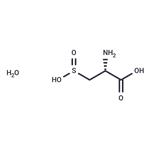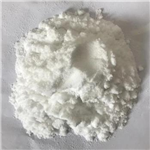Description
L-Cysteinesulfinic acid is an excitatory amino acid and agonist of metabotropic glutamate receptors (mGluRs). It increases intracellular inositol phosphate levels in CHO cells expressing mGluR1, mGluR5, or mGluR8 (EC
50s = 120, 30, and 110 μM, respectively) and inhibits forskolin-induced cAMP production in CHO cells expressing mGluR2 or mGluR6 and hamster kidney cells expressing mGluR4 (EC
50s = 100, 100, and 2,000 μM, respectively). It selectively binds to mGluR1α (K
i = 3,510 nM) over adrenergic, dopamine, histamine, muscarinic, nicotinic, or serotonin receptors (K
is = >10,000 nM for all). L-Cysteinesulfinic acid (1 mM) decreases mean arterial blood pressure and heart rate in rats when microinjected into the nucleus tractus solitarius (NTS). L-Cysteinesulfinic acid can be formed
via oxidation of L-cysteine by reactive oxygen species (ROS), and conversion of cysteine to L-cysteinesulfinic acid in cysteine-containing peptide probes has been used to measure oxidative stress.
Biochem/physiol Actions
Cysteinesulfinic acid (CSA), also called 3-sulfinoalanine is synthesized by the conversion of sulfur to sulfinic acid in cysteine by the enzyme cysteine dioxygenase (CDO). CSA is a putative excitatory amino acid (EAA) with neurotransmitter functionality. It also regulates cardiovascular functions.



